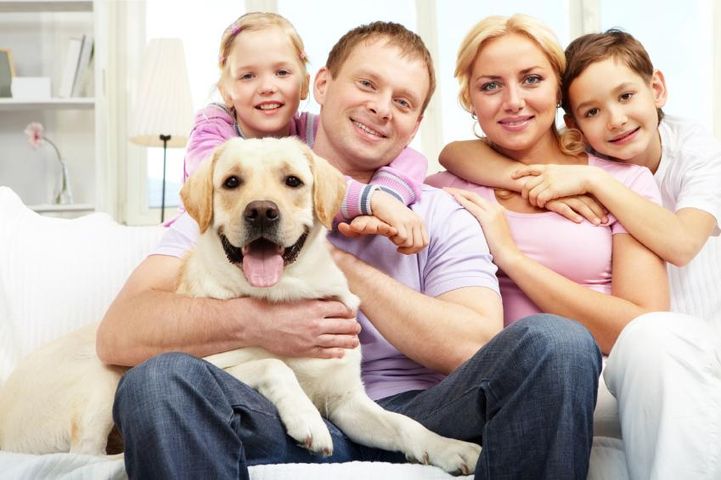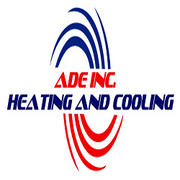Click here to read about home comfort tips for pet owners!!....

They’re a part of our families, members of the household, and close to our hearts, but let it not be mistaken, when you have pets, there are things you have to take into consideration about your household that you wouldn't otherwise. One of those areas is that of HVAC, your heating and air conditioning system and all things related to it. This includes things like indoor air quality and HVAC maintenance. It’s inevitable that having furry pets in the home is going to have an effect on your home, including your air conditioning, but that doesn’t mean they have to have a negative effect on your home comfort.
That’s why this tip of the day will be dedicated to the furriest members of the household and how HVAC and HVAC maintenance relates to them. We’ll go over a number of related subjects, ranging from safety concerns to maintaining high air quality despite the extra contaminants in the air, and more. You shouldn’t have to sacrifice any amount of comfort to own pets, and with the right tweaks to your maintenance routines and HVAC usage, you don’t have to.
Safety
In more ways than one, owning a cat or a dog is similar to having small children in the house. Except cats and dogs don’t eventually get bigger, smarter, and able to do things on their own and stay out of danger in the home. So when thinking about safety and pets, you need to take extra precautions, this includes wiring and your HVAC system.
We all know that puppies and kittens love to chew on pretty much anything they can get their paws on. Some animals continue this behavior well into adulthood. Make sure there are no exposed HVAC wires anywhere within your pet’s reach. Encase all wires in conduits and keep them as far away from your pet’s reach as possible.
The same thing goes for the outdoor unit. There is sensitive equipment in this unit that a large dog could do quite some damage too, not to mention the risk involved whenever an animal gets into mechanical equipment. That’s why it is highly recommended that you protect the outdoor elements of your HVAC unit from an inquisitive pet by putting a small fence or other barrier around the unit. This will prevent your pet from marking on the unit, which erodes the condenser fins and eventually causes leaks, or clawing the condenser coils, which could both damage the unit and injure the pet. Keep your animals and your AC unit separate to avoid costly repairs, vet bills, and emotional distress.
Your pets bring so much joy to your life and provide you with unconditional love and lots of laughter. They trust you to keep them safe from potential dangers. Make sure you’re doing everything you can to protect them from HVAC hazards. With minimal effort, your pets and your HVAC system can coexist quite peacefully.
Indoor Air Quality
Undoubtedly the most common concern pet owners have when worrying about their home comfort is how the extra fur in the house due to these pets is going to effect their indoor air quality. Even people who aren’t allergic to cats and dogs can notice an uptick in general agitation in the air when pet dander is all about. So how can you curb the effects on your indoor air quality brought on by the presence of these furry friends?
The most important and simplest tip is to simply adopt thorough and routine cleaning habits. This starts with keeping your pet plenty clean. Be sure to bathe your cat or dog regularly depending on recommendations from your groomer or veterinarian. Keep your pet’s fur brushed daily to prevent any buildup of undercoat and to reduce the effects of pet shedding.
Be aware of pet dander. Dander is oftentimes microscopic, but can cause serious issues with air quality. In fact, dander, not pet hair, is the leading cause of allergies in people to both dogs and cats. This is why bathing and brushing your pet is crucial in keeping a clean home with great air quality. Another easy way to minimize excess dander and shedding is to provide them with the best quality food you can afford as well as unlimited fresh water.
Keeping clean also refers to your living quarters. Be sure to vacuum regularly, and dust often to keep debris, dirt, and pet hair to a minimum in your home. And focus on those air vents in your home when vacuuming. Vacuuming in and around your HVAC vent covers just once a week can reduce the amount of dust, dander, debris and pet hair that impacts the air quality in your home. Additionally, if someone living in your home suffers from asthma or other breathing problems, and you have a number of indoor pets that shed frequently, it may be time to have your ducts cleaned. Duct cleaning can help you rid your home of existing dander, pet hair, and other dirt that may be lurking in your ductwork. Once your ducts are squeaky clean, it will be a breeze to maintain a happier healthier pet-friendly home when you implement the tips above.
Beyond cleaning, there are other things you can do to minimize the effect on your indoor air quality your pets have. For example, if your air ducts have cracks or leaks, this will allow pet dander an easy entryway inside the ductwork, which can majorly affect the quality of the air that passes through your home. After you have your ductwork cleaned, consider also having the ducts sealed to prevent further dirt from accumulating in your home’s ductwork.
Perhaps one of your wisest investment was a pet door that provides your cat or dog access to the backyard whether you’re home or not. Unfortunately, your energy bill isn’t thanking you and neither is your HVAC unit. Of course, a part of HVAC system maintenance is finding and repairing drafts to prevent straining your system. This includes ensuring the pet door is properly caulked to prevent heat and cold from escaping your home.
Maintenance Tips
There are plenty ways to make your experience with home comfort better even with the addition of pets into the equation. Simple maintenance routines beyond cleaning are necessary to keep your HVAC system lasting as long as possible even with all that extra fur and dander circulating in the system.
Changing your air filters often is a big one. It’s recommended that you change your air filter according to the manufacturer’s directions. Since filters vary, you’ll want to gauge how often you change it depending on what type of filter you have. Check your filter about once a month and change the filter once it appears dirty. If you have a multiple pet household, consider upgrading to a HEPA filter or switching to an air filter that can help control pet dander.
In general, homeowners should have their home’s HVAC system serviced twice a year, typically during fall and spring, before heavy usage of your HVAC system begins. By performing regular maintenance, a technician can make sure that your HVAC system is running smoothly, and notify you of any potential concerns within your system, preventing long term damage down the road.
Undoubtedly one of the best ways to save money on air conditioning in is by investing in a programmable thermostat. This enables you to lower the temperature in the winter and raise the temperature in the summer while you are at work or away from the house. And that’s no less true with pets involved. But if you have pets staying in the household while you’re at work, it’s important to choose “away” temperatures that are still safe and comfortable for your pets. After all, they’re household members too. This is especially critical if you have a dog with a heavier coat or a cat long-haired cat, for example. If you would be uncomfortably warm at that temperature, you can bet your furry friend is even warmer.
Pets, Air Quality, and Heating and Air Conditioning Repair
Dogs and cats are a natural part of life. These family members wait for us patiently at home each day and greet us after work as excitedly each time. These benefits greatly outweigh any downsides or inconveniences they might bring along with them. But that doesn’t mean there isn’t anything you can do to make living with your pets even better. General cleaning routines and certain considerations involving your HVAC system and the way it runs can go a long way in improving life with pets in the home.
Call ADE Heating and Cooling at 609-693-6050 for all of your HVAC needs!
About the Business
Have a question? Ask the experts!
Send your question

